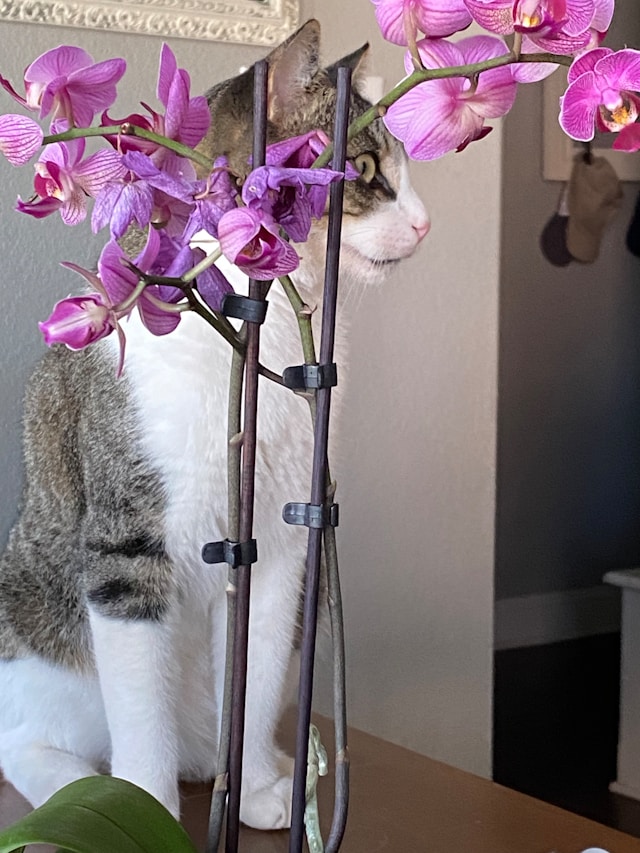Orchids Are Not Poisonous to Cats or Dogs
Are orchids poisonous to dogs or cats? No. Actually, orchids are pet friendly. You can plant orchids in your indoor or outdoor pet safe garden when you have a cat or dog. You can breathe a sigh of relief knowing that popular varieties of orchids like bat orchids are not poisonous to cats; and vanilla orchids are not toxic to dogs. Even orchid leaves are not poisonous to pets including dogs and cats.
Orchids are among the flowers we checked before featuring them on our site with the ASPCA. We also do extensive internet research for both the common and scientific name just to be super pet safe. If we cannot find direct reference, we check up to genus and so on until we can confirm whether a plant is toxic or non toxic to both cats and dogs. If we are not sure, or get contradictory information, we do not include it. Many of the plants featured we have grown successfully in our own pet safe garden in Northern California. Also, we have not grown orchids in Lovie’s outdoor pet safe garden, I know many people who have grown orchids successfully indoors. If I had a cat, orchids would be on the top of my list for an indoor sensory garden to keep my indoor cat, like our cat Spike, stimulated while beautifying the household.

Physical Attributes
Orchids have unique, bilaterally symmetrical flowers with three petals and three sepals. The flowers come in a wide range of colors, shapes, and sizes depending on the species. Orchid plants can be terrestrial (growing in soil) or epiphytic (growing on trees or rocks). They have thick, fleshy roots and leaves that store water. Plant sizes vary from miniatures a few inches tall to giants over 30 feet high.[1][2]
General Care Tips
- Light: Most orchids require bright, indirect light. Too much direct sun can burn the leaves.
- Water: Water when the potting mix begins to dry out. Avoid letting orchids sit in water.
- Temperature: Orchids prefer daytime temps of 70-85°F and cooler nights of 55-65°F.
- Humidity: Use a pebble tray or mist leaves to provide 50-70% humidity.
- Potting Mix: Use a fast-draining orchid mix or bark chips.
- Fertilizer: Feed with a balanced orchid fertilizer every 2-4 weeks when actively growing.[1][2][3]
Fun Facts
- There are over 25,000 naturally occurring orchid species, making it one of the largest plant families.
- Orchids can be found on every continent except Antarctica.
- The smallest orchid seed is just 1/300th of an inch across.
- Some orchids release their fragrance at night to attract moth pollinators.
- The vanilla bean comes from the seed pods of an orchid vine native to Mexico.
- Orchids have been cultivated for over 3,000 years, first in ancient China and Greece.[1][2][3]
Citations:
[1] https://www.southernliving.com/orchid-tree-7486707
[2] https://www.englishgardens.com/fun-facts-about-orchids/
[3] https://www.monrovia.com/be-inspired/lavender-plant-care-guide.html
[4] http://www.gardening.cornell.edu/homegardening/scene9108.html
[5] https://www.picturethisai.com/care/Orchis_purpurea.html
Here is a table with two columns and a row for each consideration about orchid flower plants:
| Consideration | Details |
|---|---|
| Container Friendly | Yes, many orchids can be grown in containers.[1][2][3] |
| Indoor/Outdoor | Both – can be grown indoors as houseplants or outdoors in suitable climates.[1][2][3] |
| Sun/Shade | Bright, indirect light or dappled shade. Too much direct sun can burn leaves.[1][2][3] |
| Perennial/Annual | Perennial[1][2][3] |
| Flowering | Exotic, bilaterally symmetrical flowers in many colors, shapes and sizes depending on species.[1][2][3] |
| Drought Tolerant | No, orchids require consistent moisture and humidity.[1][2][3] |
| Pollinator Magnet | Yes, many orchids attract pollinators like bees, moths and hummingbirds.[1][3] |
| Beginner Friendly | Can be challenging for beginners due to specific care requirements.[1][2][3] |
| Good Ground Cover | No, orchids have upright or climbing growth habits.[1][2][3] |
| Good Privacy Screen | No, most orchids are not tall enough for privacy screens. |
| Invasive/Spreader | No, orchids are not considered invasive plants.[1][2][3] |
| Hearty/Delicate | Delicate – require precise conditions to thrive.[1][2][3] |
| Rodent Repellent | Unknown, but likely not rodent repellent. |
| Deer Resistant | Unknown, but likely deer resistant due to lack of browsing. |
| Ideal States | Tropical to sub-tropical climates that can provide warm, humid conditions like Hawaii.[1][3] |
Citations:
[1] https://www.southernliving.com/orchid-tree-7486707
[2] https://www.justaddiceorchids.com/orchid-care-blog/sun-orchid-light
[3] https://www.veranda.com/outdoor-garden/g32008591/flowering-shrubs/
[4] https://www.picturethisai.com/care/Orchis_purpurea.html
[5] https://www.englishgardens.com/fun-facts-about-orchids/





